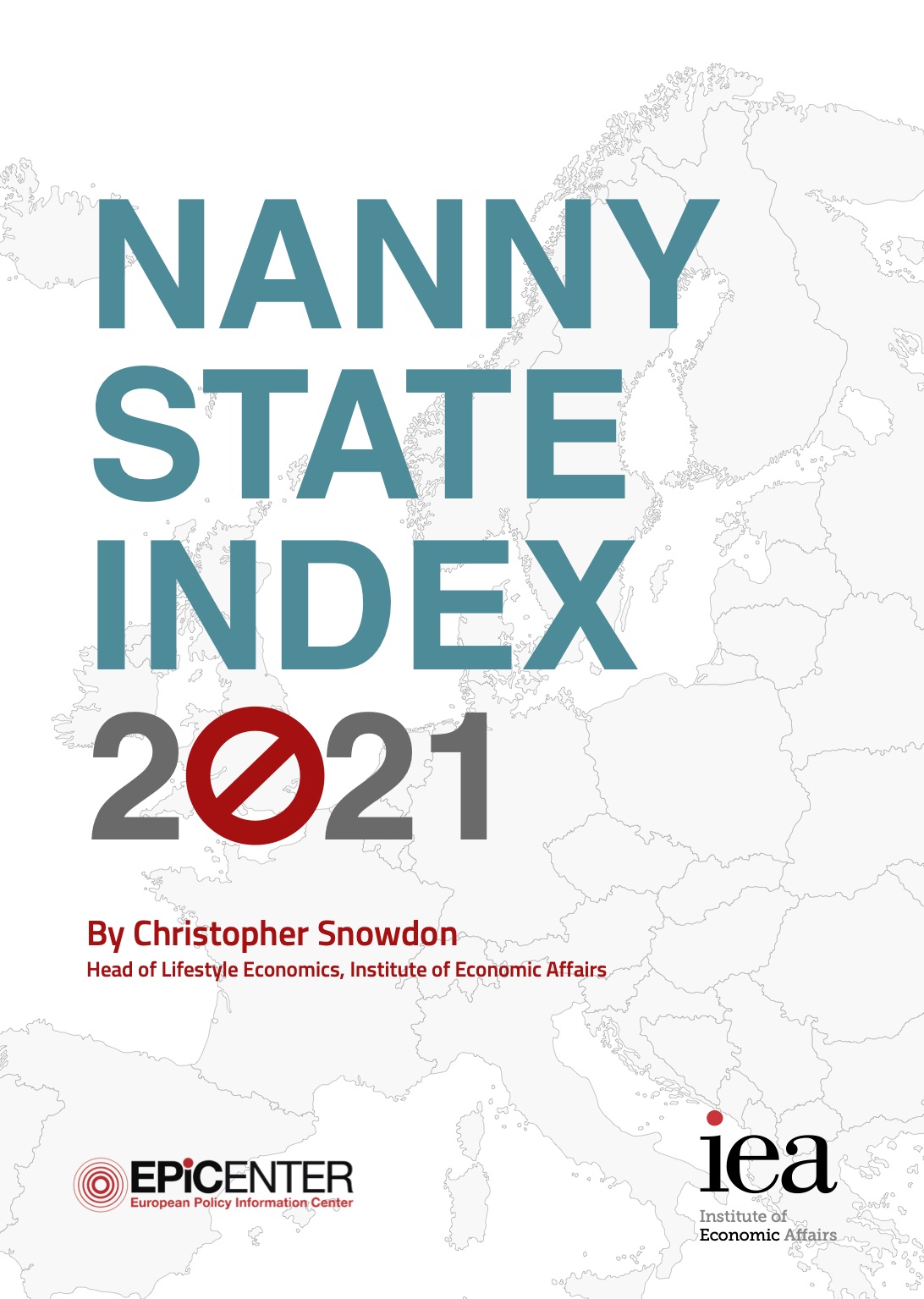
Norway is a country with a long history of nanny state regulation and it comes top of the table in the expanded Nanny State Index. In some respects, the country has been moving in a more liberal direction in recent years. Poker and boxing have been legalised, as have Segways and selling alcohol on the day of an election. Skateboarding was banned between 1978 to prevent injuries, but was legalised in 1990.
Hard liquor was legalised in 1927 after ten years of prohibition and Norway has had strict regulation of alcohol ever since. Of the 30 countries in our league table, it has the second highest taxes on wine and spirits, although they look more affordable when adjusted for income. All forms of alcohol advertising are banned. Happy hours are legal, but cannot be advertised.
The age at which alcohol can be purchased is eighteen for wine and beer, but twenty for spirits. The state has a monopoly on the sale of wine, spirits and any other drink that exceeds 4.8% ABV. Shops cannot sell alcohol after 8 pm on a weekday or after 6 pm on a Saturday. Bars cannot sell alcohol after 3 am.
Regulation of tobacco is similarly stringent. In 2004, Norway became one of the first countries to introduce a national smoking ban. Smoking is banned in all bars, restaurants, government buildings and offices, although there is an exemption for some private clubs if no food is served. There is no ban on smoking in vehicles or outdoors. All forms of tobacco advertising are illegal, a retail display ban is in place and there is a branding ban (‘plain packaging’) for all tobacco products.
Norway has had a tax on chocolate and sugar products since 1922. In 2018, this was increased by 83 per cent to 36.92 Krone per kilogram and led to frequent shopping on the Swedish border. It was subsequently reduced and currently stands a 8.49 Krone per kg (€0.84). It also has a tax on sugary drinks of 1.82 Krone per litre (€0.18) with a lower rate for fruit-based drinks.
Red Bull was banned in Norway until 2009, but is now legal and subject to the soft drink tax. As in Finland, liquorice pipes are regulated as tobacco products and must be kept behind screens in shops to prevent young people seeing them.
Snus is legal, however, and is now more popular than cigarettes. Norway’s smoking rate halved between 2007 and 2017 as snus consumption rose. Today, only nine per cent of Norwegians are daily smokers while 13 per cent are daily snus users.
Vapers are not so lucky – yet. E-cigarette devices can be sold but nicotine-containing fluids cannot, and vaping is banned wherever smoking is prohibited. However, the government announced in 2018 that it would be repealing the ban on e-cigarette sales and adopt the EU’s Tobacco Products Directive. This keeps being delayed but may finally happen in 2021. If Norway adopts more reasonable vaping regulation, it could drop to fourth place when the next edition of the index is published.
About
The Nanny State Index (NSI) is a league table of the worst places in Europe to eat, drink, smoke and vape. The initiative was launched in March 2016 and was a media hit right across Europe. It is masterminded and led by IEA’s Christopher Snowdon with partners from all over Europe.
Enquiries: info@epicenternetwork.eu
Download Publication

Previous version: 2019
Categories
About the Editor
Christopher Snowdon is the head of Lifestyle Economics at the Institute of Economic Affairs. His research focuses on lifestyle freedoms, prohibition and policy-based evidence. He is a regular contributor to the Spectator, Telegraph and Spiked and often appears on TV and radio discussing social and economic issues.
Snowdon’s work encompasses a diverse range of topics including ‘sin taxes’, state funding of charities, happiness economics, ‘public health’ regulation, gambling and the black market. Recent publications include ‘Drinking, Fast and Slow’, ‘The Proof of the Pudding: Denmark’s Fat Tax Fiasco’, ‘A Safer Bet’, and ‘You Had One Job’. He is also the author of ‘Killjoys’ (2017), ‘Selfishness, Greed and Capitalism’ (2015), ‘The Art of Suppression’ (2011), ‘The Spirit Level Delusion’ (2010), ‘Velvet Glove, Iron Fist’ (2009).
Norway 2021

Norway is a country with a long history of nanny state regulation and it comes top of the table in the expanded Nanny State Index. In some respects, the country has been moving in a more liberal direction in recent years. Poker and boxing have been legalised, as have Segways and selling alcohol on the day of an election. Skateboarding was banned between 1978 to prevent injuries, but was legalised in 1990.
Hard liquor was legalised in 1927 after ten years of prohibition and Norway has had strict regulation of alcohol ever since. Of the 30 countries in our league table, it has the second highest taxes on wine and spirits, although they look more affordable when adjusted for income. All forms of alcohol advertising are banned. Happy hours are legal, but cannot be advertised.
The age at which alcohol can be purchased is eighteen for wine and beer, but twenty for spirits. The state has a monopoly on the sale of wine, spirits and any other drink that exceeds 4.8% ABV. Shops cannot sell alcohol after 8 pm on a weekday or after 6 pm on a Saturday. Bars cannot sell alcohol after 3 am.
Regulation of tobacco is similarly stringent. In 2004, Norway became one of the first countries to introduce a national smoking ban. Smoking is banned in all bars, restaurants, government buildings and offices, although there is an exemption for some private clubs if no food is served. There is no ban on smoking in vehicles or outdoors. All forms of tobacco advertising are illegal, a retail display ban is in place and there is a branding ban (‘plain packaging’) for all tobacco products.
Norway has had a tax on chocolate and sugar products since 1922. In 2018, this was increased by 83 per cent to 36.92 Krone per kilogram and led to frequent shopping on the Swedish border. It was subsequently reduced and currently stands a 8.49 Krone per kg (€0.84). It also has a tax on sugary drinks of 1.82 Krone per litre (€0.18) with a lower rate for fruit-based drinks.
Red Bull was banned in Norway until 2009, but is now legal and subject to the soft drink tax. As in Finland, liquorice pipes are regulated as tobacco products and must be kept behind screens in shops to prevent young people seeing them.
Snus is legal, however, and is now more popular than cigarettes. Norway’s smoking rate halved between 2007 and 2017 as snus consumption rose. Today, only nine per cent of Norwegians are daily smokers while 13 per cent are daily snus users.
Vapers are not so lucky – yet. E-cigarette devices can be sold but nicotine-containing fluids cannot, and vaping is banned wherever smoking is prohibited. However, the government announced in 2018 that it would be repealing the ban on e-cigarette sales and adopt the EU’s Tobacco Products Directive. This keeps being delayed but may finally happen in 2021. If Norway adopts more reasonable vaping regulation, it could drop to fourth place when the next edition of the index is published.

 Austria
Austria Belgium
Belgium Bulgaria
Bulgaria Croatia
Croatia Cyprus
Cyprus Czech Republic
Czech Republic Denmark
Denmark Estonia
Estonia Finland
Finland France
France Germany
Germany Greece
Greece Hungary
Hungary Ireland
Ireland Italy
Italy Latvia
Latvia Lithuania
Lithuania Luxembourg
Luxembourg Malta
Malta Netherlands
Netherlands Norway
Norway Poland
Poland Portugal
Portugal Romania
Romania Slovakia
Slovakia Slovenia
Slovenia Spain
Spain Sweden
Sweden Turkey
Turkey United Kingdom
United Kingdom
















